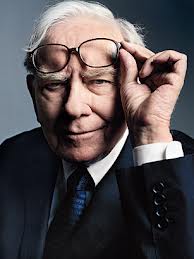 1. Conspiracy theorists who can’t let go of the fact that one of the world’s richest men probably has some advantages and influence that others don’t have. To which I say grow the f— up, this is how the world works, read a book about the Roman Empire or the Renaissance or even the elitist philosophy of Confucianism circa 500 BC. Did not Nathan Mayer Rothschild have runners and messengers in boats speeding word to him of Napoleon’s defeat at Waterloo? And did he not engineer a panic on the London bond market, first dumping consols and then scooping up everyone else’s before the official news arrived at the marketplace? Did Buffett’s viewpoint on rescuing the banks weigh on the TARP vote? Probably. Maybe. But it’s not like Warren made it a secret that he was expecting this outcome. The New York Times op-eds about betting on America might have been your first clue, Sherlock.
1. Conspiracy theorists who can’t let go of the fact that one of the world’s richest men probably has some advantages and influence that others don’t have. To which I say grow the f— up, this is how the world works, read a book about the Roman Empire or the Renaissance or even the elitist philosophy of Confucianism circa 500 BC. Did not Nathan Mayer Rothschild have runners and messengers in boats speeding word to him of Napoleon’s defeat at Waterloo? And did he not engineer a panic on the London bond market, first dumping consols and then scooping up everyone else’s before the official news arrived at the marketplace? Did Buffett’s viewpoint on rescuing the banks weigh on the TARP vote? Probably. Maybe. But it’s not like Warren made it a secret that he was expecting this outcome. The New York Times op-eds about betting on America might have been your first clue, Sherlock.
2. Hardcore right-wingers and libertarians who are incensed at Buffett’s ideas about making the tax system more progressive and eliminating absurd loopholes like carried interest. They also despise Buffett’s general views on the government’s role in capitalism, his support for President Obama and his photo ops with Jay-Z. They’ll impugn the man’s business and investing record when they can find no rational arguments against the Buffett advocacy for smarter and more equitable tax laws. They’ll call him a hypocrite and slime him for his investments in banks and derivatives. But it’s about politics, they can’t see past it. And they’ll never bring up his charitable contribution of just about the entire fortune he’s amassed.
3. The purveyors of complex investing products, sophisticated (read: expensive) strategies and short-term trading proponents who thrive on transactions and get paid when people turn greedy and fearful, buying and selling while generating turnover and commissions To them, the folksy, slow-money, common-sense approach that Buffett and Berkshire stand for are a constant obstacle in their never-ending quest to dazzle the public and, by extension, extract fees from them.
Anyway, the naysayers will criticize til the cows come home, it’s become fashionable to be skeptical and to rip down other people’s heroes.
If you tell them, for example, that Berkshire Hathaway is up 32% over the last year versus a 16% gain for the S&P 500, they will dig up a timeframe during which it’s lagged. If you discuss a smart move or deal Berkshire has made, they’ll explain to you why it’s unfair. A total waste of time debating with people who have already decided the answer to everything you’re going to say.
So let’s put the qualitative stuff aside and focus on the one thing that isn’t subject to anyone’s preconceived notions or personal biases – the long-term track record of building wealth for Berkshire Hathaway shareholders. Since this is all Warren Buffett and Charlie Munger ever focus on, let’s judge them based solely on the merits of their results in that regard.
I defer to Jeff Matthews, a long-time Buffettologist, who’s written both realistically and critically of Berkshire for more than a decade now:
But how good is Warren Buffett’s track record, really?
Well, Berkshire’s stock has appreciated—this is appreciation only, no dividends, mind you—981,150% since May 10, 1965.
And if you’d put $16 into the S&P 500 instead of into one share of Berkshire on that same day, your share of the S&P 500 wouldn’t be worth $162,905 today from appreciation (we’re leaving out the dividends for now.)
In fact, your S&P 500 share wouldn’t be worth $100,000 today.
It wouldn’t even be worth $10,000 today.
It would be worth about $600.
Throw in dividends and you’re north of $1,000 but south of $2,000 on your $16 investment. The Berkshire shareholder has $162,904.
That’s how good Warren Buffet’s track record really is.
No one is under any illusions that this kind of thing can be repeated given the fact that Berkshire is now the fifth largest public company on earth. But as Munger explained to the crowd, even if it slows down, the ride should still be pleasant.
Let me assure you that, after fifteen years in the investing game, “pleasant” – if it can actually be achieved – will be a better outcome than any of the mud-slinging hotshots will themselves be able to deliver, net of fees, net of excess volatility, net of trading costs, net of bullshit. I know these guys and I’ve seen it all – they’re not fit to wash Warren’s Cadillac.
